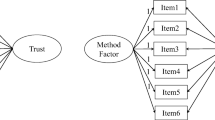Abstract
The validity of the World Values Survey (WVS) question used to measure trust is disputed over and this article is intended to present the results of an online survey, conducted in Brazil, which tested the meaning of the term trust in the WVS question. The surveyed population is entirely Brazilian and the majority has received some form of higher education. The results of the survey partially corroborate the validity of the WVS and partially deny it. Within the results of this survey there are predominantly two dominant perspectives represented within the surveyed population including: respondents who think in friends and relatives as part of most people have a higher probability of also saying to trust most people which means that different people may be answering slightly different questions. However, respondents who say that trust most people have higher levels of trust in people in general than in family if compared with respondents who say to not trust most people which is in accordance with the expectation that the question adequately measures generalized interpersonal trust.















Similar content being viewed by others
Notes
My argument is based on Elster’s discussion on collective action (Elster 1994).
The questionnaire and the collected data can be found at http://www.lepem.ufc.br/dados/conf2013/. The questionnaire is available in two formats: HTML without the question numbers, as the respondents have seen it, and PDF, with the question numbers.
The figure shows a violin plot which combines the features of box plots and density plots.
References
Almeida, A. C., Schroeder, A., & Cheibub, Z. (2002). PESB: Pesquisa Social Brasileira. In Consrcio de Informaes Sociais. Rio de Janeiro: Universidade Federal Fluminense. [Dataset].
Beugelsdijk, S. (2006). A note on the theory and measurement of trust in explaining differences in economic growth. Cambridge Journal of Economics, 30, 371–387.
Borsboom, D., Mellenbergh, G. J., & van Heerden, J. (2004). The concept of validity. Psychological Review, 111(4), 1061–1071.
Bulloch, S. (2013). Seeking construct validity in interpersonal trust research: A proposal on linking theory and survey measures. Social Indicators Research, 113(3), 1289–1310.
Coleman, J. S. (1990). Foundations of social theory. Cambridge: Harvard University Press.
Elster, J. (1994). Peas e engrenagens das ciłncias sociais. Rio de Janeiro: Relume-Dumar. [1989].
Feres Júnior, J., & Eisenberg, J. (2006). Dormindo com o inimigo: Uma crtica ao conceito de confiana. Dados—Revista de Ciłncias Sociais, 49(3), 457–481.
Gintis, H., Bowles, S., Boyd, R., & Fehr, E. (2003). Explaining altruistic behavior in humans. Evolution and Human Behavior, 24, 153–172.
Inácio, M., & Araújo, P. M. (2007). Engajamento cvico, confiana e background social. In N. Aguiar (Ed.), Desigualdades sociais, redes de sociabilidade e participao poltica (pp. 229–240). Belo Horizonte: Editora UFMG.
Inglehart, R. (2003). How solid is mass support for democracy—And how can we measure it? Political Science and Politics, 36, 51–57.
Inglehart, R., & Welzel, C. (2005). Modernization, cultural change, and democracy: The human development sequence. New York: Cambridge University Press.
Leung, S. O. (2011). A comparison of psychometric properties and normality in 4-, 5-, 6-, and 11-point likert scales. Journal of Social Service Research, 37(4), 412–421.
Leung, S. O., & Xu, M. L. (2013). Single-item measures for subjective academic performance, self-esteem, and socioeconomic status. Journal of Social Service Research, 39(4), 1–10.
Lundåsen, S. (2002). Podemos confiar nas medidas de confiana? Opinio Pblica, 8(2), 304–327.
Moisés, J. A., & Carneiro, G. P. (2008). Democracia, desconfiana poltica e insatisfao com o regime: O caso do Brasil. Opinio Pblica, 14(1), 1–42.
Putnam, R. D. (2000). Comunidade e democracia: A experiłncia da Itlia moderna (2nd ed.). Rio de Janeiro: Editora FGV. [1993].
Reis, B. P. W. (2003). Capital social e confiana: questes de teoria e mtodo. Revista de Sociologia e Poltica, 11(21), 35–49. http://www.scielo.br/scielo.php?script=sci_issues&pid=0104-4478&lng=en&nrm=iso
Rennó, L. (2011). Validade e confiabilidade das medidas de confiana interpessoal: O Barmetro das Amricas. Dados—Revista de Ciłncias Sociais, 54(3), 391–428.
Rosenberg, M. (1956). Misanthropy and political ideology. American Sociological Review, 21(6), 690–695.
Seligson, M. A., & Rennó, L. R. (2000). Mensurando confiana interpessoal: Notas acerca de um conceito multidimensional. Dados—Revista de Ciłncias Sociais, 43(4), 783–803.
Sturgis, P., & Smith, P. (2010). Assessing the validity of generalized trust questions: What kind of trust are we measuring? International Journal of Public Opinion Research, 22(1), 74–92.
Torpe, L., & Lolle, H. (2011). Identifying social trust in cross-country analysis: Do we really measure the same? Social Indicators Research, 103(3), 481–500.
Uslaner, E. M. (2007). The foundations of trust: Macro and micro. Cambridge Journal of Economics, 32(2), 289–294.
Uslaner, E. M. (2008). Where you stand depends upon where your grandparents sat: The inheritability of generalized trust. Public Opinion Quarterly, 72(4), 725–740.
Acknowledgments
I am grateful to all respondents who have answered the questionnaire, and I am especially grateful to Camila Maria Cunha de Souza, FUNCAP undergraduate researcher fellow, who helped me to develop and administer the questionnaire, and to an anonymous reviewer whose many suggestions allowed me to significantly improve the article.
Author information
Authors and Affiliations
Corresponding author
Rights and permissions
About this article
Cite this article
de Aquino, J.A. The Meaning of Trust for Brazilians with Higher Education. Soc Indic Res 130, 325–349 (2017). https://doi.org/10.1007/s11205-015-1178-0
Accepted:
Published:
Issue Date:
DOI: https://doi.org/10.1007/s11205-015-1178-0




